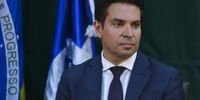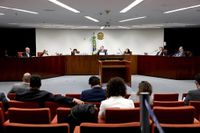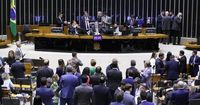On Friday, May 9, 2025, the Supreme Federal Court (STF) is set to deliberate on a significant decision made by the Chamber of Deputies regarding the suspension of criminal action against federal deputy Alexandre Ramagem (PL-RJ). This decision is linked to a coup plot involving former president Jair Bolsonaro, and the implications of the ruling could reverberate across Brazil's political landscape.
The STF's virtual session will commence at 11 AM, with a voting conclusion expected by Tuesday, May 13, 2025. This timeline is critical as it follows the Chamber's decision made on May 7, 2025, which suspended the criminal action stemming from the complaint outlined in petition number 12.100.
The First Panel of the STF had previously accepted the complaint against Ramagem and seven others, collectively known as the "Nucleus 1" of the coup plot, during a unanimous vote on March 26, 2025. This group includes high-profile figures such as Bolsonaro himself, former Defense Minister Walter Braga Netto, and other military officials.
On May 8, 2025, the political parties Rede Sustentabilidade and PDT filed a lawsuit with the STF, challenging the constitutionality of the Chamber's decision. This move highlights the contentious nature of the political environment surrounding the case, as the suspension not only affects Ramagem but also potentially benefits Bolsonaro and other defendants involved in the coup inquiry.
The Chamber's resolution, which was approved by the Commission of Constitution and Justice, has drawn criticism from various legal experts. They argue that while the Constitution allows for the suspension of criminal actions against sitting parliamentarians, it does not extend to defendants who do not hold a congressional mandate. Legal scholars emphasize that the immunity granted to parliamentarians should not be misinterpreted as a blanket protection for all defendants in a single case.
According to the Constitution, the suspension of criminal action can only occur for crimes committed after a deputy's or senator's election, as outlined in Article 53. The STF had previously communicated to the Chamber that while such suspensions are permissible, they only apply to offenses committed after the official assumption of office, which for Ramagem occurred in December 2022.
Legal experts such as Georges Abboud and Renato Stanziola Vieira have expressed skepticism about the validity of the Chamber's resolution. Abboud stated, "The power of the Chamber to suspend a criminal action is strictly related to the parliamentary immunity of the member, and thus does not extend to other co-defendants without such immunity." This sentiment is echoed by other constitutionalists who argue that the deputies' interpretation of the law is flawed and could set a dangerous precedent.
The resolution passed by the Chamber aims to suspend the criminal actions against Ramagem entirely, which critics argue is an overreach. The legal framework suggests that only specific crimes attributed to Ramagem, namely those committed after his inauguration, should be considered for suspension. The majority of the charges against him are linked to events prior to his election, particularly the violent attacks on January 8, 2023, which targeted Brazil's governmental institutions.
Furthermore, the STF's own guidelines indicate that the suspension of actions is not applicable to all defendants in a case, particularly those who do not possess parliamentary immunity. This principle is reinforced by the STF's summary 245, which clarifies that immunity does not extend to co-defendants lacking such privileges.
In light of these developments, the political maneuvering surrounding Ramagem's case raises questions about the integrity of Brazil's judicial system and the legislative body's role in influencing legal proceedings. The Chamber's decision has been interpreted by some as an attempt to shield Bolsonaro and his associates from accountability for their alleged roles in the coup attempt.
As the STF prepares to review the Chamber's decision, the potential outcomes could have far-reaching implications for Brazilian politics. Should the Court uphold the suspension, it may embolden other politicians facing legal scrutiny, while a rejection could reaffirm the judiciary's independence and commitment to upholding the rule of law.
Legal analysts are closely monitoring the situation, with many anticipating that the Court will not only address the constitutionality of the Chamber's resolution but also clarify the boundaries of parliamentary immunity in relation to criminal proceedings. The stakes are particularly high given the ongoing debates regarding the legitimacy of the actions taken by Bolsonaro and his allies during their time in power.
In the coming days, as the STF deliberates, the political atmosphere in Brazil remains charged. The ramifications of this case could redefine the relationship between the legislative and judicial branches, as well as impact the broader public's trust in the political system.
As the clock ticks down to the Court's ruling, all eyes will be on the proceedings, with the potential for significant shifts in the political landscape depending on the outcome.






